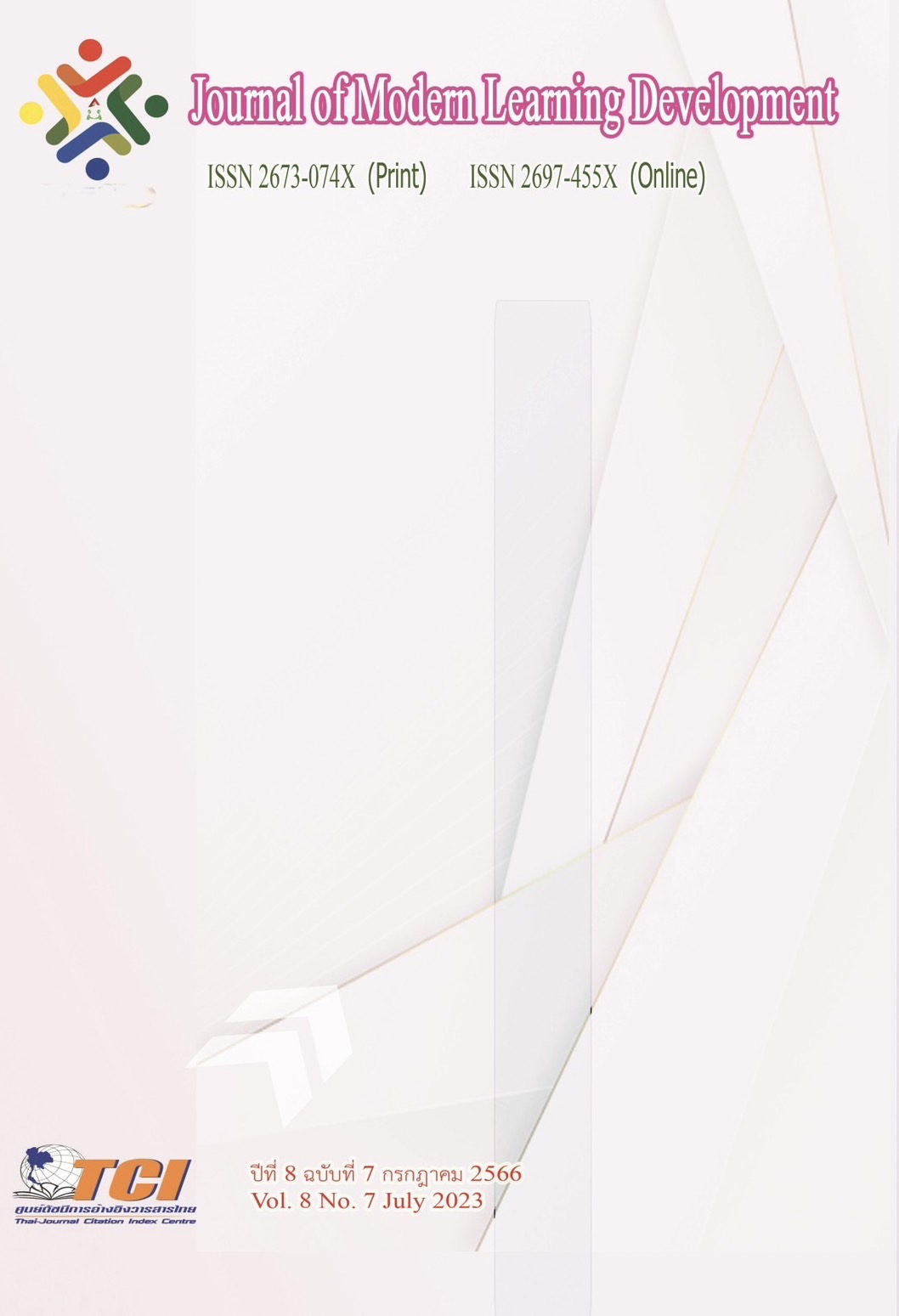Academic Leadership of School Principals and Learning Organization in the Basic Educational Schools under the Bangkok Metropolitan Administration, North Krung Thon Group
Main Article Content
Abstract
“The objective this study aimed to, 1) levels to academic leadership of basic educational institution administrators, levels to learning organization ofbasic educational institution, and 3)academic leadership of educational institutionadministrators affecting the learning organization of basic educational institution, North Krung Thon group. A sample group comprised 320 principals and teachers in the schools under the BMA, North Krung Thon group. A questionnaire, with a reliability of .943, was used as a research instrument. Data were analyzed utilizing frequency, percentage, mean, standard deviation, Pearson's correlation, and Stepwise multiple regression analysis.
The findings revealed that (1) the overall level of the academic leadership of the principals in the schools under the BMA, North Krung Thon group was high. When inspecting individual aspects, it was found that the highest average aspect was monitoring students' progress, followed by organizing learning support activities for students, while communicating the school's goals was the lowest. (2) Overall level of the learning organization of the schools under the BMA, North Krung Thon group was high. When inspecting individual aspects, the highest average aspect was being knowledgeable, followed by the thought pattern, while the lowest was constructing a shared vision. (3) the academic leadership of the school principals in the aspect of assigning teachers to take good care of students (X8) and organizing the learning support activities (X11) affected the overall (Ytot) learning organization status of the schools under the BMA, North Krung Thon group, significantly at .05 level. The multiple regression equations could be drawn as follows:
Raw score equation Y' = 2.080 + 0.375(X8) + 0.143(X11) (R2 = 0.484)
Standardized score equation Zy'= 0.522(X8) + 0.213(X11) (R2 = 0.484)
Article Details
References
กระทรวงศึกษาธิการ. (2553). หลักสูตรแกนกลางการศึกษาขั้นพื้นฐานพุทธศักราช2551. (พิมพ์ครั้งที่ 3).กรุงเทพมหานคร: โรงพิมพ์ชุมนุม สหกรณ์การเกษตรแห่งประเทศไทย.
จุฑาทิพย์ ชัยบัณฑิต. (2560). ความสัมพันธ์ระหว่างภาวะผู้นาทางวิชาการของผู้บริหารสถานศึกษากับความเป็นองค์กรแห่งการเรียนรู้ของโรงเรียนมัธยมศึกษา สังกัดสำนักงานเขตพื้นที่มัธยมศึกษาเขต 16. วิทยานิพนธ์ ศษ.ม. บัณฑิตวิทยาลัย: มหาวิทยาลัยหาดใหญ่.
ธีระ รุญเจริญ. (2550). ความเป็นมืออาชีพในการจัดและบริหารการศึกษา ยุคปฏิรูปการศึกษา. (พิมพ์ครั้งที่ 4). กรุงเทพมหานคร: ข้าวฟ่าง
ปรียาพร วงศ์อนุตรโรจน์. (2553). การบริหารงานวิชาการ. กรุงเทพมหานคร: ศูนย์สื่อเสริมกรุงเทพมหานคร.
ปิยะวรรณ แวววรรณจิตต์. (2561). ภาวะผู้นำทางวิชาการของผู้บริหารสถานศึกษาที่ส่งผลต่อการเป็นองค์การแห่งการเรียนรู้ของสถานศึกษาสังกัดกรุงเทพมหานคร สำนักงานเขตทุ่งครุ. วิทยานิพนธ์การศึกษามหาบัณฑิต สาขาการบริหารและการจัดการการศึกษา. บัณฑิตวิทยาลัย: มหาวิทยาลัยศรีนครินทรวิโรฒ.
สุกฤตา วัฒนเกษมสกุล. (2562). ความสัมพันธ์ระหว่างภาวะผู้นำทางวิชาการของผู้บริหารสถานศึกษากับการเป็นองค์การแห่งการเรียนรู้ของสถานศึกษาสังกัดสำนักงานเขตพื้นที่การศึกษาประถมศึกษายะลาเขต 3. สารนิพนธ์นี้เป็นส่วนหนึ่งของการศึกษาตามหลักสูตรปริญญาศึกษาศาสตรมหาบัณฑิตสาขาวิชาการบริหารการศึกษา. บัณฑิตวิทยาลัย: มหาวิทยาลัยหาดใหญ่.
สมถวิล ศิลปคนธรรพ์ . (2556). ศึกษาภาวะผู้นำทางวิชาการของผู้บริหารที่ส่งผลต่อการเป็นองค์การแห่งการเรียนรู้ในสถานศึกษาขั้นพื้นฐาน สังกัดสำนักงานเขตพื้นที่การศึกษาประถมศึกษาสมุทรสาคร.วิทยานิพนธ์ปริญญามหาบัณฑิต สาขาบริหารการศึกษา. บัณฑิตวิทยาลัย: มหาวิทยาลัยศิลปากร.
Best, John W. 1977. Research in Education. (3rd ed). Englewood Cliffs, New Jersey : Prentice Hall, Inc
Davis, G. A., & Tomas, M. A. (1989). Effective schools and effective teacher. Boston: Allyn and Bacon.
Hallinger, P., & Murphy, M. ( 1985).Assessing the instructional management behavior of principals. The Elementary School Journal. 8 (6), 221-224.
Kaiser, Sandra M. (2000). Mapping the Learning Organization: Exploring A Model of OrganizationalLearning.N.P.: Dissertation for the Louisiana State University. Retrieved from https://digitalcommons.lsu.edu/cgi/viewcontent.cgi?article=8202&
context=gradschool_disstheses.
Leithwood, K. (2006). A review of the research: Education leadership. The laboratory forstudent success at temple university center for research in human development and education. University of Toronto. Online. Retrieved on August 28, 2006 from http://www.temple.edu/lss.
Senge, P.M. (1990). The Fifth Discipline: The Artand Practice of the Learning Organization. New York: Doubleday Currencey.


